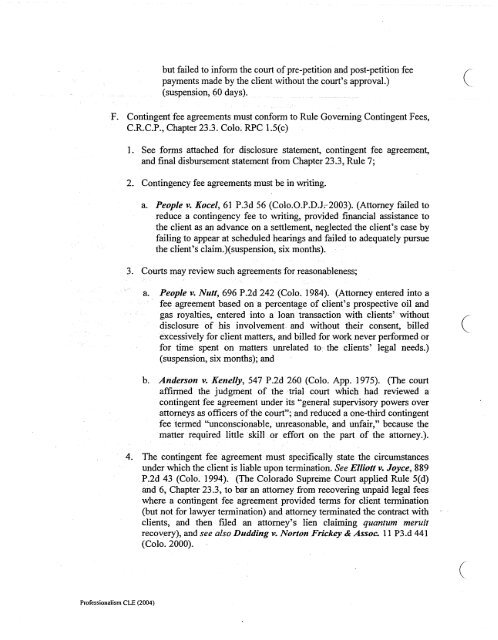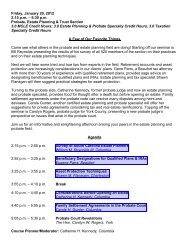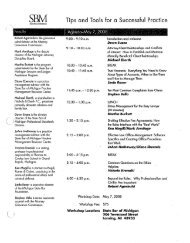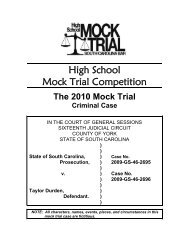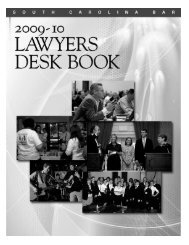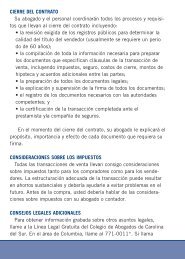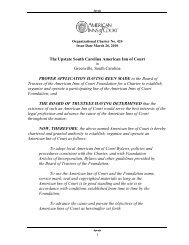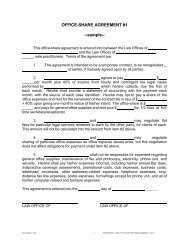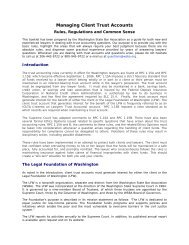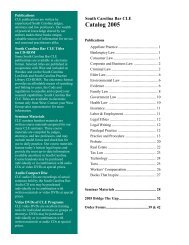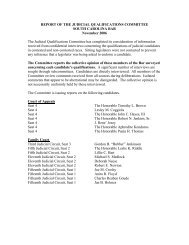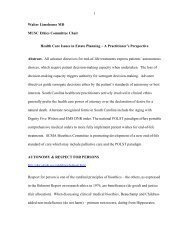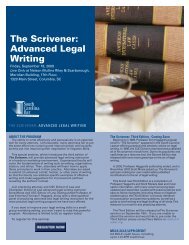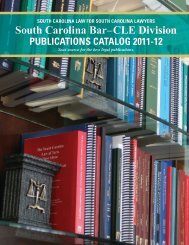Practicing With Professionalism - South Carolina Bar Association
Practicing With Professionalism - South Carolina Bar Association
Practicing With Professionalism - South Carolina Bar Association
You also want an ePaper? Increase the reach of your titles
YUMPU automatically turns print PDFs into web optimized ePapers that Google loves.
ut failed to inform the court ofpre-petition and post-petition fee<br />
payments made by the client without the court's approval.)<br />
(suspension, 60 days).<br />
(<br />
,F.<br />
Contingenffee agreements must conform to Rule Governing Contingent Fees,<br />
C.R.C.P., Chapter 23.3. Colo. RPC I.5(c)<br />
1. See forms attached for disclosure statement, contingent fee agreement,<br />
and final disbursement statement from Chapter 23.3, Rule 7;<br />
2. Contingency fee agreements must be in writing.<br />
a. People v. Kocel, 61 P.3d 56 (Colo.O.P.D.J;·'2003). (Attorney failed to<br />
reduce a contingency fee to writing, provided financial assistance to<br />
the client as an advance on a settlement, neglected the client's case by<br />
failing to appear at scheduled hearings and failed to adequately pursue<br />
the client's claim.)(suspension, six months).<br />
3. Courts may review such agreements for reasonableness;<br />
a. People v. NUll, 696 P.2d 242 (Colo. 1984). (Attorney entered into a<br />
fee agreement based ona percentage of client's prospective oil and<br />
gas royalties, entered into a loan transaction with clients' without<br />
disclosure of his involvement and without their consent, billed<br />
excessively for client matters, and billed for work never performed or<br />
for time spent on matters unrelated to the clients' legal needs.)<br />
(suspension, six months); and<br />
('<br />
b. Anderson v. Kenelly, 547 P.2d 260 (Colo. App. 1975). (The court<br />
affirmed the judgment of the trial court which had reviewed a<br />
contingent fee agreement under its "general supervisory powers over<br />
attorneys as officers ofthe court"; and reduced a one-third contingent<br />
fee termed "unconscionable, unreasonable, and unfair," because the<br />
matter required little skill or effort on the part of the attorney.).<br />
4. The contingent fee agreement must specifically state the circumstances<br />
under which the client is liable upon termination. See Elliott v. Joyce, 889<br />
P.2d 43 (Colo. 1994). (The Colorado Supreme Court applied Rule Sed)<br />
and 6, Chapter 23.3, to bar an attorney from recovering unpaid legal fees<br />
where a contingent fee agreement provided terms for client termination<br />
(but not for lawyer termination) and attorney terminated the contract with<br />
clients, and then fiJed an attorney's lien claiming quantum meruit<br />
recov~ry), and see also Dudding v. Norton Frickey & Assoc. 11 P3.d 441<br />
(Colo. 2000).<br />
(<br />
<strong>Professionalism</strong> eLE (2004)


